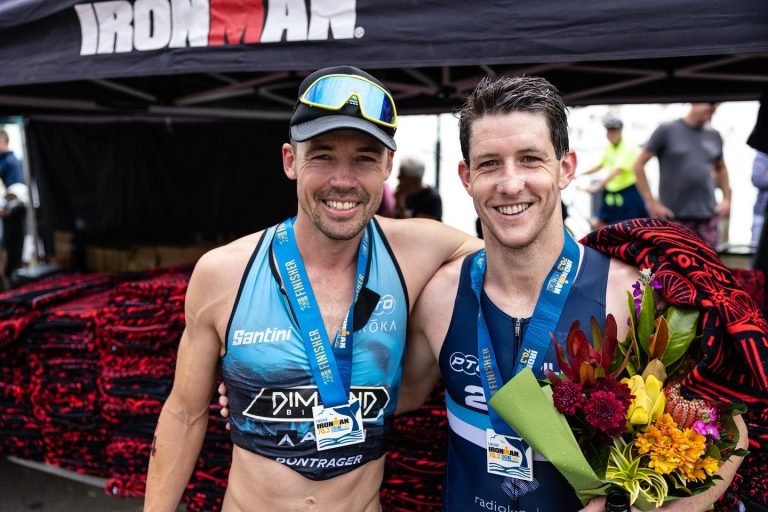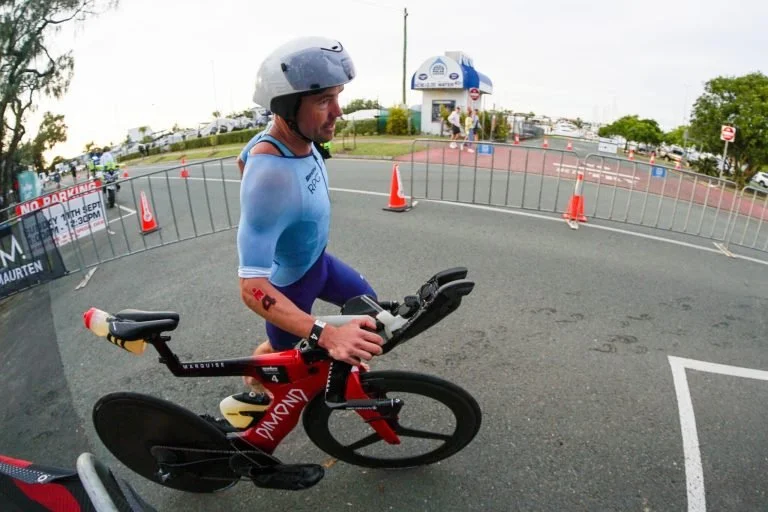WHEN SHOULD YOU GO PRO?
Steve McKenna and Tim Reed – Image Credit- @koruptvision
Author - RPG Coach Reedy
Over the years we’ve had lots of age groupers turn pro. Some are successful, others not. Some on our recommendation, some in the absence of our recommendation but very rarely would we advise against going pro at all ‘if’ the decision and risk won’t negatively affect their loved ones. The variation in advice from our end tends to be based around ‘when’ not ‘if’. I have a lot more respect for the solid age grouper athlete who was brave enough to have a crack at turning pro and it not working out than the age group athlete, enjoying the comfort of a regular pay cheque and never risking public humiliation of not being good enough but doesn’t mind ripping the struggling pros who are having a crack.
A wise coach from my younger years, Grant Giles (coach at Sansego) demonstrated to me that it should never be the coach to guess what an athlete’s ceiling of achievement could be. I went from being told by a coach in the Triathlon high performance program that I was too far behind in terms of development to “ever be an elite” largely as I was really just learning to swim to working with Gilesy who never bothered with such judgments. To be fair, Gilesy had chosen the path of a private coaching business not at the mercy of a government funded high performance program where every staff member has to create gold from dust before another Olympic cycle of judgment and changes in staff. Gilesy was happy to play the long game. It can take 7-10 years for athletes to start to see their endurance sports performance potential and I was lucky to land in a group where there was no mad rush to get results or get out.
The coach’s role is to do what we can to try and facilitate the athletes’ improvement not guess the limits on where those improvements may stop. The human body is remarkably trainable if the mind is willing to put in the work year after year. For sure, great natural physiology is a huge advantage but we’ve all seen tonnes of talented athletes with a head start on the tools necessary to be elite simply not be consistent enough with the yearly grind of training or have the mongrel in races to utilise that talent. The opposite is also regularly observed even from the athletes we’ve coached. I’ve had athletes who I thought (but not expressed) ‘geez this fella is going to struggle to ever win his AG let alone make a buck turning pro’ to watch them diligently lay down solid work week after week, year after year, and go on to win 70.3 events and have consistent podiums at a pro level.
Quite simply, even the best coaches, with the best talent identification testing and programs don’t know the limits or potential of the athlete as much as we like to think we do.
Back to the core question, when should an athlete go pro? The answer comes back to the coach’s core role; what will make the athlete the best athlete they can be?
I recently had the pleasure of Liam Duval coming up to train one-on-one with me ahead of his pro debut at Ironman Busselton. I’ll use Liam because it’s easy to find recent photos amongst an endless stream of images of my dog and kids as the example of the athlete with the conundrum around when to turn pro and myself because I’m clinging on to some sort of relevancy in the sport and my ‘when’ was very different to Liam’s ‘when’.
Apologies in advance for referring to myself in the first and third person. It’s confusing even for me.
Liam Duval 2022, horrible swimmer, strong bike and runner. Tim Reed 2008, a horrible swimmer, strong bike, and runner. Not as strong as Liam but for the sake of this article let’s pretend all things are equal.
The key differences in why Liam should turn pro now at the same level I was at in 2008 and why I should have and did wait 2 years before turning pro in 2010 come down to a few factors.
Ego. Will the athlete be ok with getting their arse handed to them as they steadily improve?
Time. Does the athlete have the capability of changing the amount of time they have for recovery and training to be in the ballpark with the other pros?
Money and sponsorship.
Liam Duval soon to have his pro debut..
Photo Cred- @wes_thompsonn
Coach Reed’s ego wouldn’t have handled going pro when he first qualified to do so.
Ego
Liam will we be way behind the pro race in Busso after the swim. However given his ever improving bike and run and the explosive nature of the pro race up front if he has a strong consistent day he could see himself up in the top 10 by the finish as others, who took a shot at the win, end up pulling out or doing the Ironman shuffle as they survive to the end.
As an exercise physiologist, Liam is thankfully very numbers focused and can stick to the process in an Ironman, keeping his emotions to a minimum throughout the day and ticking off some very objective race goals. If Liam finishes 2nd or 2nd last pro and his numbers are better than he’s put out in an Ironman before, he’ll be satisfied.
The other factor that is important to Liam is a fair race. Excluding the live coverage motos etc that 100% drag the lead athletes to a quicker bike time (I’m not complaining just stating the facts- I’ve both won and lost races because of this advantage) it’s still going to be a much more fair race then coming from behind in the age group field where it’s impossible to police drafting on a busy course with the current system of well meaning volunteer motorbikes. A super strong age group biker coming from behind will often end up with a steady line of athletes built up behind their wheel, some of whom will outrun him with their fresher legs.
Myself on the other hand, at least back in 2008 before I understood the importance of focusing on your numbers in Ironman, was very results focused. I lived with a perpetual chip on my shoulder in a largely imagined world where everyone doubted me and I had to prove them all wrong. If I finished 2nd last I would have been devastated, even if my numbers were better than ever before. My motivation and self belief would have taken a massive hit. My ego wouldn’t have coped well. When I turned pro I wanted to be in the mix. I had to prove everyone in my imaginary world wrong. In regards to ego. Liam should turn pro to maximise his rate of improvement and, Tim Reed in 2008 shouldn’t.
Time
Liam is 30 years old and has built up his own business to the point that he can increasingly take more time out of his day to put into his training and recovery. This is hugely important. If an age group athlete wants to step up to a pro level, they have to at least, have a work day or two of accumulated extra time to put into either training or even doing the same amount of training as they were doing as an age grouper but invest it into recovery time.
Tim Reed in 2008 was working for the man, training the moonlight hours, and didn’t really have the option of changing that until he had saved enough to take the financial risk of going pro. The pro licence was available but I couldn’t really see how I was going to find the time to do any extra training or recovery to make the necessary performance jump to the pro level so turning pro didn’t make a lot of sense.
Liam should go pro, Tim Reed in 2008 should not.
Photo Credit- @westhompsonn
Money and Sponsorship
There are plenty of age group athletes out there who are getting great support for winning their age group consistently and for good reason. Age group wins at national and world title levels especially will typically bring in decent coverage for the supporting brands.
Let’s be honest, the top couple of ‘amateurs’ in Kona are typically not working much to achieve what they do. It’s a super high level. They’re often working much less than many pros and will normally have a reasonable level of support. Should they turn pro and achieve the same time in Kona in the pro ranks as their age group winning time suddenly the accolades and admiration disappear as will some of their sponsor support. Unfortunately, athletes who have good support for their age group results will often lose much of that support as they go from winning age group races to the back of the pack in the pro field. Those who are getting some spono love such as free bikes, shoes, and perhaps some travel should really think hard about whether they should make the jump into the pro ranks as this could disappear for a while.
For Liam, there is increasing local support but they’ve mainly come onboard because they want to help with his transition into the pro ranks, not because of his age group results as he’s only really started seeing why he needs to join the narcissistic modern era of promoting every single thing he does in the sport to create value for sponsors.
For Tim Reed in 2008, it was prior to the age of elite level narcissism to get sponsorship (although I adapted to that remarkably well as that era engulfed us) I was starting to get some product sponsorships for my age group results including, shoes, sunglasses, super cheap bikes, etc which now would seem a waste of time but back then was a huge help towards competing in a sport.
Based on this… Liam should turn pro, Tim Reed in 2008 should not.
As I mentioned, turning pro is a big decision in those early years and I’m not delving too far into that side of it except to say if it won’t affect the people you love to take the risk, life is for living not regrets. However, if you’re going to do it, the timing of when you do can be the difference between being able to do it for one year or ten years. Consider the ‘when’ very seriously.
Now you’re here..one of the most successful age group athletes to transition to a successful pro career has joined the RPG Coaching team. Find out more about Kyle Buckingham in the link below and hit us up if you’re interested in being coached by Kyle.





